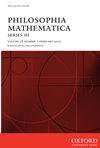大基数公理是限制性的吗?
IF 0.6
1区 哲学
Q2 HISTORY & PHILOSOPHY OF SCIENCE
引用次数: 0
摘要
摘要集合论中的独立性现象虽然普遍存在,但可以通过使用大基数公理来部分地解决。一个普遍假设的想法是,大基本公理是极大性原则的一种。在本文中,我对这种说法提出了质疑。我证明了存在一种极大性(即绝对性),在此基础上,相对于限制性的正式概念,大的基本公理是限制性的。在这个框架内,我认为大基本公理仍然可以发挥许多通常的基础作用。本文章由计算机程序翻译,如有差异,请以英文原文为准。
Are Large Cardinal Axioms Restrictive?
Abstract The independence phenomenon in set theory, while pervasive, can be partially addressed through the use of large cardinal axioms. A commonly assumed idea is that large cardinal axioms are species of maximality principles. In this paper I question this claim. I show that there is a kind of maximality (namely absoluteness) on which large cardinal axioms come out as restrictive relative to a formal notion of restrictiveness. Within this framework, I argue that large cardinal axioms can still play many of their usual foundational roles.
求助全文
通过发布文献求助,成功后即可免费获取论文全文。
去求助
来源期刊

Philosophia Mathematica
HISTORY & PHILOSOPHY OF SCIENCE-
CiteScore
1.70
自引率
9.10%
发文量
26
审稿时长
>12 weeks
期刊介绍:
Philosophia Mathematica is the only journal in the world devoted specifically to philosophy of mathematics. The journal publishes peer-reviewed new work in philosophy of mathematics, the application of mathematics, and computing. In addition to main articles, sometimes grouped on a single theme, there are shorter discussion notes, letters, and book reviews. The journal is published online-only, with three issues published per year.
 求助内容:
求助内容: 应助结果提醒方式:
应助结果提醒方式:


